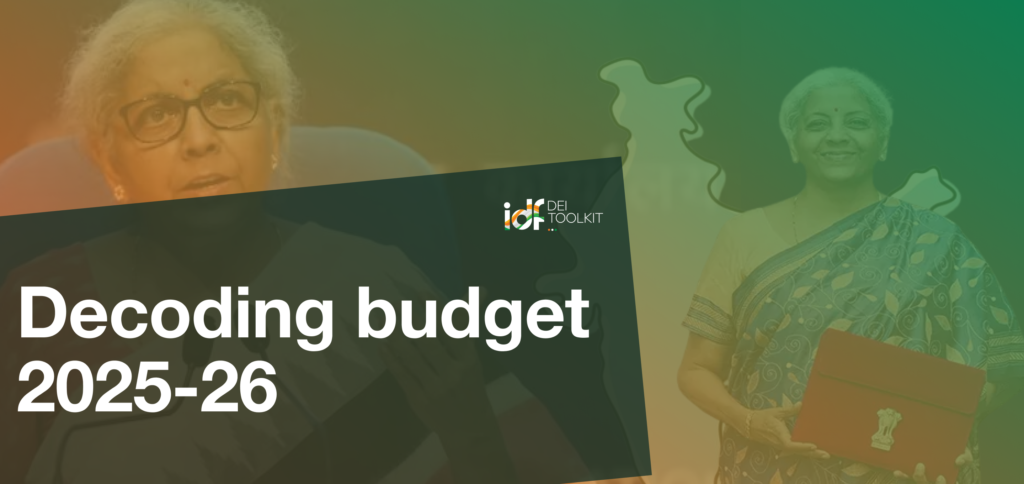The Union Budget 2025-26, presented by Finance Minister Nirmala Sitharaman, is a significant milestone that reflects the Indian government’s commitment to fostering inclusive growth. With a focus on empowering marginalized communities, enhancing agricultural productivity, and supporting various sectors, this budget aims to lay the foundation for a resilient and equitable economy. For the India Diversity Forum, this budget presents an opportunity to align its initiatives with government priorities, driving forward the agenda of diversity, equity, and inclusion (DEI) in India.

Key Highlights of the Union Budget 2025-26
1. Prime Minister Dhan-Dhaanya Krishi Yojana
The budget introduces the Prime Minister Dhan-Dhaanya Krishi Yojana, targeting 100 districts with low agricultural productivity. This initiative aims to:
- Enhance agricultural productivity through improved practices.
- Promote crop diversification and sustainable farming.
- Upgrade irrigation facilities and improve post-harvest storage.
- Facilitate access to credit for farmers.
By benefiting approximately 1.7 crore farmers, many of whom are members of agricultural cooperatives, this program seeks to empower rural communities and enhance food security.
2. Rural Prosperity and Resilience Program
The Rural Prosperity and Resilience Program is a comprehensive initiative designed to address underemployment in agriculture through:
- Skilling programs tailored for rural youth and women.
- Investment in rural enterprises to stimulate local economies.
- Technological integration to modernize agricultural practices.
This program emphasizes creating job opportunities in rural areas, ensuring that migration becomes an option rather than a necessity. By focusing on marginalized groups, including young farmers and landless families, it aims to strengthen cooperative movements and promote self-reliance.
3. Support for MSMEs and Cooperative Entrepreneurs
Recognizing the vital role of Micro, Small, and Medium Enterprises (MSMEs) in economic growth, the budget outlines measures to:
- Enhance credit availability with guarantee cover for small businesses.
- Launch a new scheme providing term loans up to ₹2 crore for first-time women, SC/ST entrepreneurs.
These initiatives are expected to encourage the formation of new cooperative enterprises, promoting entrepreneurship among marginalized communities and contributing to balanced economic development.
4. Enhanced Credit Access through Kisan Credit Cards
The budget proposes increasing loan limits for Kisan Credit Cards from ₹3 lakh to ₹5 lakh under a modified interest subvention scheme. This move aims to provide farmers with greater financial flexibility to invest in modern farming techniques and sustainable practices. Enhanced credit access is anticipated to boost agricultural productivity and income levels among cooperative members.
5. Focus on Education and Skill Development
With an allocation of ₹128,650 crore for education, the budget emphasizes skill development as a cornerstone for future growth. The introduction of 50,000 Atal Tinkering Labs in government schools will foster innovation among students. Additionally, initiatives like the Bharatiya Bhasha Pustak Scheme aim to enhance linguistic diversity in education, ensuring that students can engage with academic content in their native languages.
Implications for India Diversity Forum
As we analyze these key highlights from the Union Budget 2025-26, it becomes clear that there are numerous opportunities for the India Diversity Forum to align its initiatives with government priorities:
Strategic Alignment with Government Initiatives
- Empowering Marginalized Communities: The focus on supporting women entrepreneurs and marginalized groups through targeted funding aligns perfectly with IDF’s mission to promote diversity and inclusion in all sectors.
- Enhancing Agricultural Cooperatives: By advocating for policies that strengthen agricultural cooperatives, IDF can help ensure that benefits reach grassroots levels, fostering collective growth within rural communities.
- Promoting Skill Development: Collaborating with government initiatives aimed at skill development will allow IDF to enhance its training programs, ensuring they meet the evolving needs of diverse populations.
- Fostering Inclusive Education: The emphasis on inclusive education provides an opportunity for IDF to engage with educational institutions and promote DEI principles within curricula.
- Supporting MSME Growth: By facilitating partnerships with MSMEs and promoting cooperative entrepreneurship among marginalized communities, IDF can contribute significantly to economic resilience.
Conclusion
The Union Budget 2025-26 is not just about fiscal allocations; it represents a commitment to inclusive growth that resonates deeply with the mission of the India Diversity Forum. By focusing on empowering marginalized communities, enhancing agricultural productivity, supporting education initiatives, and fostering entrepreneurship, this budget lays the groundwork for a more equitable society. As we move forward, it is crucial for organizations like IDF to leverage these government initiatives effectively while advocating for policies that promote diversity and inclusion across all sectors. Together, we can work towards building a more inclusive India where everyone has the opportunity to thrive.

